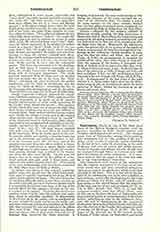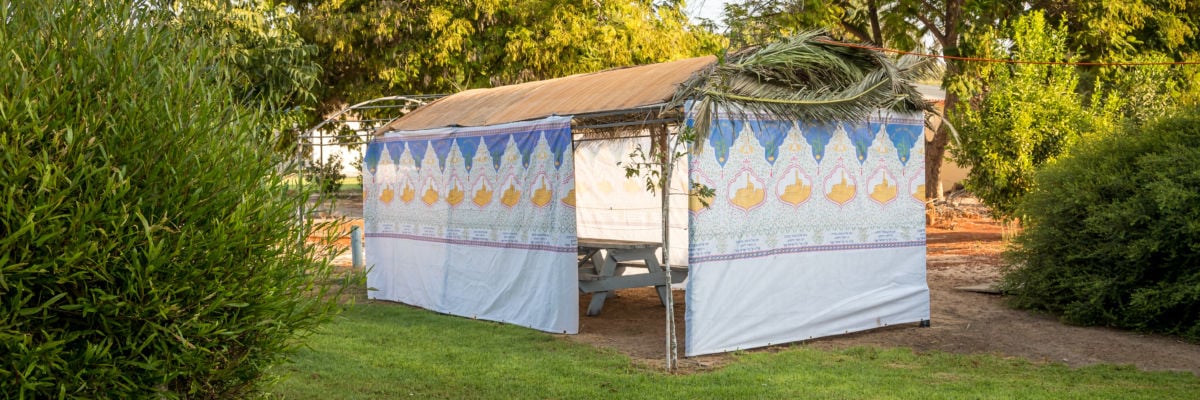

Tabernacles, FEAST OF, one of the three great feasts of the Hebrew liturgical calendar, even the greatest, according to Philo (Greek: eorton megiste) and Josephus (Greek: eorte agiotate kai megiste). The common name, feast of Tabernacles—among Greek-speaking Jews Greek: skenopegia, that is, “the pitching of the tent” (John, vii, 2)—recalls to mind the custom established by the law of Lev., xxiii, 40, of erecting on the roofs of houses, and even in streets and public squares, booths of branches and foliage, wherein all who were not exempted through illness or weakness were obliged to live during the entire celebration. It is sometimes asserted that the origin of the feast was similar to our “harvest-home” festivities:
This naturalistic view, based on the assumption that the religious enactments of the Law are of relatively recent date and mere sacerdotal ordinances, takes no account of the significance which at all times attached to the feast. True it is that one of the features of the celebrations was to be, after a fashion, a harvest-home, and to offer thanksgiving for the crops of the year (Deut., xvi, 13; Ex., xxiii, 16); and it is perhaps owing to this special feature that the character of the feast was one of joy and merriment (cf. Ps. iv, 7-8, in Heb.; Joseph., Ant., VIII, iv, 1), and that numerous sacrifices were then offered (Num., xxix, 12-39); yet to the Jews the feast of Tabernacles was always and primarily in commemoration of their forefathers’ indwelling in tents in the wilderness (Lev., xxiii 43) and in thanksgiving for the permanent abode given them in the Promised Land, and, later on, after the erection of the Temple, for a permanent place of worship (cf. III Kings, viii, 2; xii, 32). The feast began on the fifteenth day of the seventh month, Ethanim of Tishri (about our September), and lasted seven days (Lev., xxiii, 34-36). Every male Israelite was, according to law, obliged to go to Jerusalem, and “every one who was of the people of Israel” was bound to live in booths, which, though involving some discomfort, at the same time contributed much to the merriment attending the celebration. The distinctions between rich and poor were then somewhat obliterated in the general encampment, and thus the feast had a most beneficial social influence. The first day was held most solemn and considered a sabbath, all servile work being forbidden on that day (Lev., xxiii, 39; Num., xxix, 35); during the whole octave numerous sacrifices were offered (Num., xxix 12-39) and on the eighth day [styled the great(est) day of the feast in John, vii, 37], was held a sabbath like the first and marked by special sacrifices of its own, the booths were broken up and the people returned home.
After the Exile, the feast was protracted to the twenty-fifth of the month, and two new rites were added to the old ceremonial. Every morning of the celebration a priest went down to the Siloe Fountain, whence he brought in a golden ewer water which was poured on the altar of holocausts amidst the singing of the Hallel (Pas. cxii-cxvii) and the joyful sound of musical instruments. It was possibly the performance of this ceremony (the institution of which may have been suggested by Is., xii, 3) which afforded to Our Lord the occasion to compare the action of the Holy Ghost in the faithful to a spring of living water (John, vii, 37-39). The other new feature added to the ritual of the feast was the illuminations of the women’s court, together with the singing of the Psalms of the Degrees (Pss. cxix-cxxxiii) and the performance of dances or processions in the sacred precincts. On the eighth day a procession went seven times around the altar, the people carrying myrtle-boughs and palms and shouting: “Hosannah!” in memory of the fall of Jericho.
Every seven years, that is in the year of release, during the feast of Tabernacles the Law was to be read before all the people according to the command found in Deut., xxxi, 10. But this enactment was probably soon found to be impracticable; and thus the Jewish authorities arranged to read on every sabbath, commencing with the sabbath after the feast of Tabernacles in one year of release and ending with the feast of Tabernacles in the next year of release, a portion of the Law so calculated that the whole Pentateuch would be read through in seven years. Thus would in some way the commandment be fulfilled. Some time later, the Jews of Palestine lengthened the sections for each sabbath in such a manner that the entire Law could be read in three years (Talm. Babyl. Megillah, 29b). At present (and this custom seems to go back to the first century B.C.) the Jews have the Pentateuch so divided that they read it through every year, the first Parashah (division) being appointed for the sabbath after the feast of Tabernacles, and the last chapters for the last day of the feast in the next year, this being the day of “rejoicing in the Law“.
CHARLES L. SOUVAY


